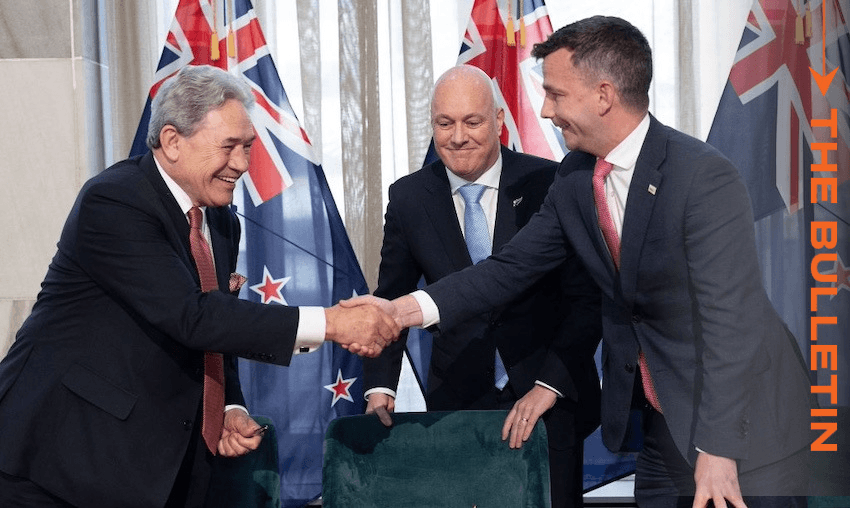Do the policies agreed to on Friday really herald the ‘most right wing government since the early 1990s’, asks Catherine McGregor in this excerpt from The Bulletin, The Spinoff’s morning news round-up. To receive The Bulletin in full each weekday, sign up here.
The governor general makes it official today
Roles have been doled out, moving boxes are unpacked, and today at 11am the new prime minister and ministers will assemble at Government House for a swearing-in ceremony presided over by governor general Dame Cindy Kiro. Afterwards, the cabinet holds its first, ceremonial, meeting, and then the entire government buckles down to work on delivering the ambitious policy programme signed onto by the trio whom Tova O’Brien – and absolutely nobody else – is insisting on referring to as “Lupesey”. Reactions to those deals continued to trickle in through the weekend. Oliver Hartwich, executive director of the NZ Initiative, expressed jubilation, observing that policy after policy closely aligned with the right-leaning think tank’s own advocacy. On the other side of the spectrum was 1 News’ John Campbell who called the dual agreements “empty” and “mean”, decrying their “narrow, limp vision of our future”.
Smokefree bonfire to fill National’s fiscal hole
Among the policies coming in for particular scrutiny is the planned repeal of smokefree laws by March 2024. Both Act and New Zealand First had been “insistent” on reversing the restrictions, incoming finance minister Nicola Willis told Newshub Nation. Extra revenue from more widespread cigarette sales would help fund tax cuts in lieu of the now-scrapped foreign buyers tax, she added, prompting accusations that long-term public health had been sacrificed for a short-term cash grab. Boyd Swinburn of Health Coalition Aotearoa said it would be “a major loss for public health, and a huge win for the tobacco industry whose profits will be boosted at the expense of Kiwi lives”. Smoking rates have halved for nearly every ethnicity over the last decade, “a stunning endorsement of health campaigners’ successes” according to Max Rashbrooke in The Spinoff. The new government has also vowed to ban disposable vaping products and increase penalties for illegal vape sales to under-18s, strengthening the vaping restrictions that came into effect in September.
How far will the government’s ‘anti-woke’ policies go?
It’ll be potentially the most right wing government since the early 1990s (at least according to Stuff political editor Luke Malpass), and it’s kicking off a “War on Woke”, with everything from te reo signage to the Treaty of Waitangi in its sights. Thomas Manch of the Sunday Star-Times (SST) (paywalled) has a meaty analysis of the changes on the table regarding te Tiriti. Unwinding co-governance arrangements like the Māori Health Authority will be stage one, he says, then comes the more complicated issue of Treaty Principles in New Zealand law – both Act and NZ First want their role significantly diminished. It’s a prospect that has many commentators appalled. Mihingarangi Forbes tells Newshub the coalition is “[burning] the house down”, while John Campbell says the coalition’s approach to Māori issues is “its heart of darkness”. SST editor Tracy Watkins says the anti-woke crusade will exacerbate social divisions, but ultimately te reo and te ao Māori are too culturally enmeshed in Aotearoa for it to succeed. Act and NZ First supporters are “about to learn that no government can turn back the clock by decree”, she writes (paywalled).
Growing support for four-year terms
National is promising to introduce legislation on a four-year parliamentary election cycle within the first 15 months in power. It’s an idea that has significant support across the political spectrum, as well as among the public. A 2020 survey found 61% support for a move from three years, indicating a change in public mood on the subject. Previous referendums in 1967 and 1990 both defeated the proposal by more than two-thirds majorities. New Zealand has one of the shortest parliamentary terms in the world. Of 190 countries with parliaments, just nine, including NZ, have three year terms.
